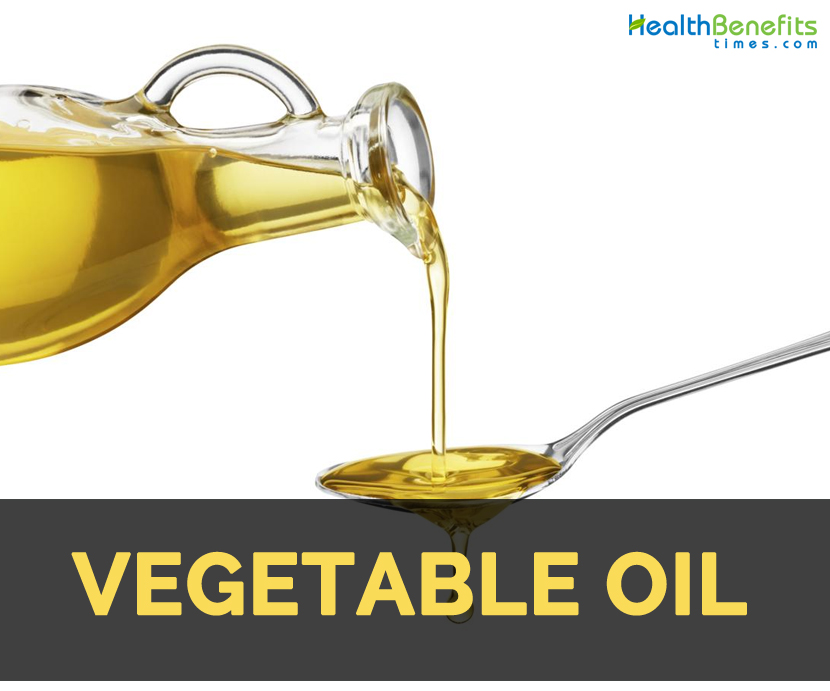| Vegetable oil Quick Facts | |
|---|---|
| Name: | Vegetable oil |
| Major nutrients | Vitamin A (20.71%) Vitamin B1 (12.33%) Sodium (5.67%) Total Fat (1.26%) Vitamin B3 (0.81%) |
| Health benefits | Lowers heart problems, Lowers the chances of breast cancer, Immune health, Increase metabolism, Promote cell growth |
In these present days, western diet consists of high level of vegetable oils and needs to be estimated in the ratio of 16:1. The unbalanced level of omega-3 and omega 6 fats are associated with increasing chances of cancer, autoimmune disease, chronic inflammation and cardiovascular problems. These could be prevented by lowering an intake of omega-6 fatty acids.
As the oils have been derived from seeds of fruits and vegetables, it has become an essential part of the diet. It is used for cooking purposes such as frying, salad dressing and shortening agent for baking. Moreover, vegetable oils help to promote digestion and metabolism, lowering the chances of cardiovascular problems, provides omega-3 fatty acids and also lowers the chances of breast cancer.
How is it made?
Firstly, vegetables are crushed in order to extract the oil. Then the crushed mixture is heated and combined with hexane which a chemical that assist to extract the remaining oil. The solids are used for animal feed and hexane is distilled from crude oil which goes through a refining process for eliminating impurities that affects smell, color and taste of oil. The three steps to refining process are: refining, bleaching and deodorizing.
Health Benefits of Vegetable Oil
Vegetable oil offers these health benefits:
- Lowers heart problems
Vegetable oil lowers the chances of heart problems. The study viewed the factors related with developing cardiovascular diseases such as increased blood pressure, increased blood sugar level and increased serum cholesterol level.
- Lowers the chances of breast cancer
The daily use of olive oil and vegetable oils is helpful in lowering the chances of developing breast cancer in comparison to those consuming margarine and butter.
- Immune health
Vegetable oil such as coconut oil contains lauric acid helps to lower candida, counteract bacteria and forms hostile environment for viruses.
- Increase metabolism
An intake of vegetable oil increase metabolism in obese people. An olive oil possesses phenolic compounds that have anti-inflammatory, anti-oxidant and anti-blood clotting properties that could increase the metabolic rate of the body.
- Promote cell growth
The oils such as cottonseed, safflower, wheat germ and almond oil are rich in Vitamin E that is essential for cell protection and development in the body. It also protect tissues such as eyes, skin, testes, breasts and liver.
- Enhance growth
Alpha-linolenic acid which is an omega-3 fatty acids could be found in canola, soybean and flaxseed oil that has anti-inflammatory properties. It is highly recommended for people with skin, chronic heart and digestive problems.
- Reduce anxiety and depression
Sesame oil has tyrosine that is directly associated to serotonin activity and release in brain that could promote mood by flooding body with hormones and enzymes that makes people happy.
- Curing acute pancreatitis
Olive oil has high content of hydroxytyrosol and oleic acid that affects in development of actue pancreatitis. Study found out that components found in extra virgin olive oil could prevent the chances of acute pancreatitis.
- Anti-bacterial activity
Olive oil contains many nutrients that can inhibit or kill harmful bacteria. Studies have shown extra virgin olive oil to be effective against eight strains of bacteria, three of which are resistant to antibiotics.
- Prevent osteoporosis
Coconut oil is loaded with antioxidants that assist to counteract free radicals which are a natural cure for osteoporosis. Research showed that coconut oil promotes bone volume and also lowered bone loss caused due to osteoporosis.
- Cure stomach ulcers
Coconut promotes digestive health by absorbing calcium, vitamins and magnesium and also treats ulcerative colitis and stomach ulcers. This oil promotes gut heat and improves bacteria by eliminating candida and bad bacteria.
- Antioxidant activity
Oils such as almond oil, peanut oil and wheat germ oil offers high content of vitamin E that is beneficial for the body. It also improve immune health and being an antioxidant it protects body tissues such as eyes, skin and also prevent heart diseases. It is an antioxidant which eliminates free radicals, assist blood clots and clear blockage in coronary arteries which helps to prevent cardiovascular problems.
https://www.youtube.com/watch?v=C0Hfh3wbTTc
How to Eat
- It is used for salad dressings and also used as a substitute for butter.
- It is used in desserts.
- It is also used for roasting, searing, baking, marinating, seasoning and deep frying and also to make dips, sauces and dressings.
- It could be added to casseroles and soups.
- This oil could be used to sauté vegetables.
- Vegetable oil is used for baking pastries and breads frying.
References:
https://wellnessmama.com/2193/never-eat-vegetable-oil/
http://www.ok.org/article/what-is-vegetable-oil/
https://foodal.com/knowledge/paleo/vegetable-oils-varieties-flavor-uses-for-the-home-cook/
https://www.plated.com/morsel/cooking-oils/
https://www.fitday.com/fitness-articles/fitness/4-keto-recipes-to-get-you-through-the-week.html
https://www.lybrate.com/topic/benefits-of-vegetable-oil-and-its-side-effects
Comments
comments
